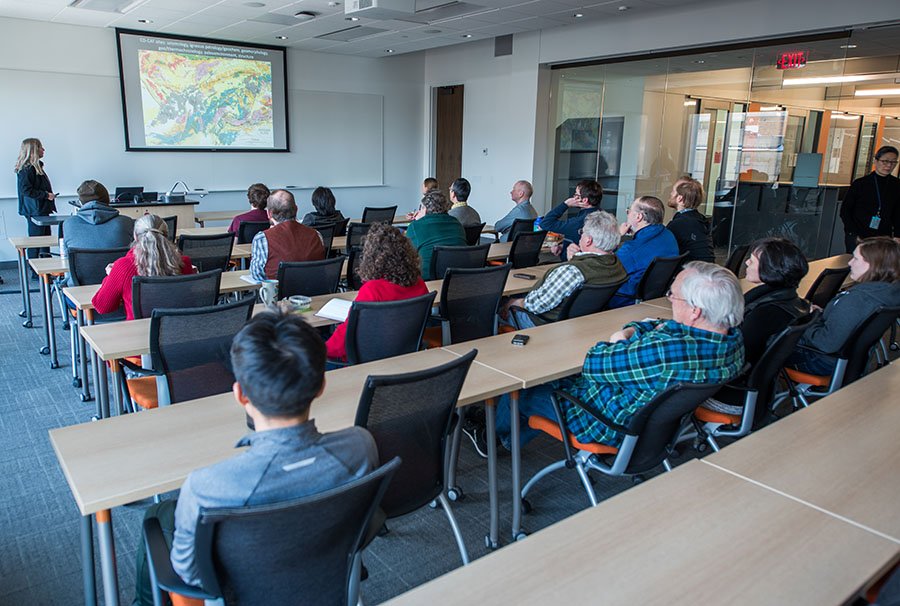Department Seminar Series
The 2023-24 Department Seminars will be hosted in a hybrid modality. The in-person talk will take place in Tate Hall room B20, or you can watch virtually via zoom on Thursdays at 4:00 p.m. The Zoom link for each individual seminar will be sent out in the weekly seminar announcement. If you do not receive these announcements and would like to join us for our virtual seminar, please send us an email so we may send you the appropriate Zoom webinar link. If you would like to be added to the seminar announcement list, please contact Kaleigh Swift at swift095@umn.edu.
If you missed a seminar, make sure to check our department YouTube channel for the recording. Seminar recordings are posted by 12:00 pm on the Friday following seminar. Please note, not all seminars will be posted as it is up to the discretion of our speakers.
* denotes seminars that are closed to the public
January 18
Dr. Anjali Fernandes, Assistant Professor, Earth and Environmental Sciences, Denison University
Decoding River Response to Environmental Change using Earth's Sedimentary and Biogeochemical Archives
January 25
Dr. Donna Whitney, Professor, Earth & Environmental Sciences, University of Minnesota
Subducting oceans
February 8
Dr. Jasmina Wiemann, Agouron Postdoctoral Fellow, Division of Geology, Field Museum & Department of Geophysical Sciences, University of Chicago
Life finds a way: biomolecule fossilization products reveal the history of Life on Earth and beyond
February 15*
ESCI URGE Committee
Annual Update
February 22
Dr. Emily Brodsky, Professor, Earth and Planetary Sciences, UC Santa Cruz
The Earthquake Problem
February 29
Dr. Lucas Landherr, Associate Teaching Professor, Chemical Engineering, Northeastern University
Drawn to STEM: The Integration of Visualization Into Education Through Comics and Animation To Improve Learning
March 7
No-Seminar - Spring Break
March 14
Dr. Laurence Coogan, Professor, Earth and Ocean Sciences, University of Victoria
Reconsidering Earth’s silicate-carbonate weathering "thermostat" and its imprint on seawater chemistry
March 21
Dr. Donald Penman, Assistant Professor, Geosciences Department, Utah State University
Carbon and Silica Cycle Coupling During Cenozoic Warm Periods
March 28
Tom Hale, PhD Candidate, Geography & Spatial Sciences, University of Delaware
Exploring the Mineral-Security Nexus
April 1 - Monday Seminar (Tate 105)
Dr. Matt Becker (Darcy Lecture), Conrey Endowed Chair of Hydrogeology, and Professor, CSU Long Beach
How Groundwater Impacts the People and Ecosystems of the South Pacific Islands
April 4
Dr. Shandin Pete, Assistant Professor of Teaching; University of British Columbia - Earth, Ocean and Atmospheric Science Department – Vancouver, BC, CAN
An Exemplar of Resilient Salish Hydrologic Knowledge found in Oral Traditions.
April 11*
Tentatively booked for faculty search
April 18
Dr. Crystal Ng, Associate Professor, Earth & Environmental Sciences, University of Minnesota
Determining the eco-hydrobiogeochemical response of tropical glacierized watersheds under a changing climate
Abstract
Compared to mid- to high-latitudes, there is a concerning paucity of studies examining mountain watershed responses to glacier retreat in the tropics, given that glaciers there are already in a state of year-round net ablation and are thus highly vulnerable to further climate change. Of the glacier studies that have emerged from the tropics, most have focused on hydrological consequences and have looked at the outer tropics. Here, we present recent findings from two glacierized watersheds located in the Andean inner tropics, where glaciers undergo a unique climate with subtle seasonal trends, exclusively occupy volcanoes, and are perched above carbon-rich páramo ecosystems that serve as global biodiversity hotspots. This complex setting calls for an interdisciplinary investigation of the interactions among climate, glaciers, water, geological context, vegetation, and elemental cycles to understand recent and future shifts. We examine not only how streamflow has been changing with accelerated glacier retreat, but also the roles of hidden groundwater contributions through the highly porous media, ecohydrological influences of plants migrating upslope with warming, and the release of different solutes under varied volcanic controls. Through a combination of field observations and watershed modeling, we have found that rapid glacier retreat in our study watersheds releases meltwater that moves in part via the subsurface, and this drives variable streamflow at sub-seasonal to interannual time scales that is further influenced by shifts in evaporation/transpiration partitioning. Our results also show that with subsurface flow paths that support weathering and hydrothermal waters, changes in meltwater infiltration could alter the export of a range of major ions, some of which serve as critical nutrients and can influence organic solutes. We end with a look ahead at how these eco-hydrogeochemical responses could be important for regional carbon cycling, as well as local water and land resources for communities living at these mountain bases.
April 25
Dr. Robin Canup (Nier Lecture), Assistance Vice President, Solar System Studies & Exploration Division, Southwest Research Institute
TBD
